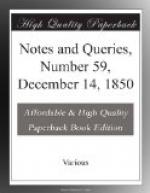The Bull of Leo X., which confers the title on Henry VIII. personally, does not make it inheritable by his successors, so that none but that king himself could claim the honour. The Bull granted two years afterwards by Clement VII. merely confirms the grant of Pope Leo to the king himself. It was given, as we know, for his assertion of doctrines of the Church of Rome; yet he retained it after his separation from the Roman Catholic communion, and after it had been formally revoked and withdrawn by Pope Paul III. in the twenty-seventh year of Henry VIII., upon the king’s apostacy in turning suppressor of religious houses. In 1543, the Reformation legislature and the Anti-papal king, without condescending to notice any Papal Bulls, assumed to treat the title that the Pope had given and taken away as a subject of Parliamentary gift, and annexed it for ever to the English crown by the statute 35 Hen. VIII. c. 3., from which I make the following extract, as its language bears upon the question:
“Where our most dread, &c., lord the king, hath heretofore been, and is justly, lawfully, and notoriously knowen, named, published, and declared to be King of England, France, and Ireland, Defender of the Faith, and the Church of England and also of Ireland, in earth supreme head; and hath justly and lawfully used the title and name thereof as to his Grace appertaineth. Be it enacted, &c., that all and singular his Graces’ subject, &c., shall from henceforth accept and take the same his Majesty’s style ... viz., in the English tongue by these words, Henry the Eighth, by the grace of God King of England, France, and Ireland, Defender of the Faith, and of the Church of England, and also of Ireland, in earth the supreme head; and that the said style, &c., shall be, &c., united {482} and annexed for ever to the imperial crown of his highness’s realms of England.”
By the supposed authority of this statute, and notwithstanding the revocation of the title by Pope Paul III., and its omission in the Bull addressed by Pope Julius III. to Philip and Mary, that princess, before and after her marriage, used this style, and the statute having, been re-established by 1 Eliz. c. 1., the example has been followed by her royal Protestant successors, who wished thereby to declare themselves Defenders of the Anti-papal Church. The learned Bishop Gibson, in his Codex (i. 33, note), treats this title as having commenced in Henry VIII. So do Blount, Cowel, and such like authorities.
WM. SIDNEY GIBSON.
Newcastle-on-Tyne, Dec. 1850.
P.S. Since writing the above, I have found (in the nineteenth volume of Archaeologia, pp. 1-10.) an essay by Mr. Alex. Luders on this very subject, in which that able writer, who was well accustomed to examine historical records, refers to many examples in which the title “Most Christian King” was attributed to, or used by English sovereigns, as well as the kings of France; and to the fact, that




